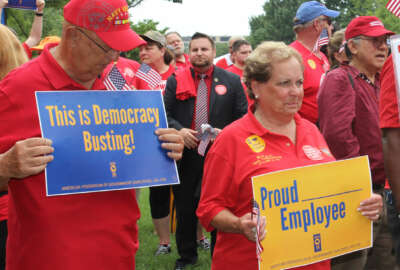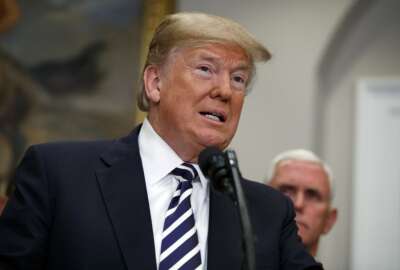

A federal district court judge issued a long-awaited decision on the legality of President Donald Trump's executive orders on official time, collective bargaining...
Best listening experience is on Chrome, Firefox or Safari. Subscribe to Federal Drive’s daily audio interviews on Apple Podcasts or PodcastOne.
In a highly-anticipated decision, a federal district judge invalidated nine provisions of the president’s executive orders on official time, collective bargaining and employee removals, in response to a series of legal challenges from a coalition of federal unions.
The decision, which came late Friday night, prevents agencies from implementing or enacting the following provisions of the president’s EOs:
More than a dozen federal unions, led by the American Federation of Government Employees (AFGE), National Treasury Employees Union (NTEU) and National Federation of Government Employees (NFFE), had separately sued the Trump administration over the president’s executive orders, which the administration released May 25, earlier this summer.
Together, they consolidated their lawsuits and sought summary judgment on four separate motions before the U.S. District Court for the District of Columbia.
In her opinion, D.C. District Court Judge Ketanji Jackson did not declare the executive orders themselves as violations of the law. The president did not overstep his executive authority or constitutional power by issuing these executive orders on federal labor-management relations, she said.
But, nine of the provisions outlined in the Trump’s three executive orders conflict with the original intention Congress had in drafting and passing the Civil Service Reform Act and Federal Labor-Management Relations Statute back in 1978.
“This court has concluded that many of the challenged provisions of the orders at issue here effectively reduce the scope of the right to bargain collectively as Congress has crafted it, or impair the ability of agency officials to bargain in good faith as Congress has directed, and therefore cannot be sustained,” Jackson wrote.
Federal unions early Saturday morning declared the court’s decision a win.
“These provisions were flatly inconsistent with the civil service law established by Congress,” NTEU National President Tony Reardon said in a statement. “Congress meant for unions and agencies to bargain over how official time and grievance procedures can best be used to help employees and agencies work better together. It was wrong for the president, through unilateral, executive fiat, to ban bargaining over such matters.”
Suzanne Summerlin, NFFE associate general counsel, said: “Federal employees can return to work on Monday knowing that their rights are intact, and that presidential overreach targeting career civil servants was curbed.”
Jackson in July heard a series of oral arguments from attorneys representing both the unions and the Trump administration. Jackson had initially told federal unions she planned to issue a decision soon after oral arguments on July 25, but she pushed the timeline back when it became apparent the case was complex.
In the three months that the EOs have been operational, collaboration between labor and management — which was already on unstable turf — has soured.
Some agencies had already begun to implement pieces of the executive orders, after the Office of Personnel Management told departments with open collective bargaining agreements to begin informing union representatives of the changes.
The Social Security Administration and Housing and Urban Development Department had told union representatives to vacate federal offices and return government-issued property.
The Health and Human Services Department revived previously-stalled collective bargaining negotiations and quickly presented new bargaining proposals to NTEU. HHS has declared an impasse.
Union representatives have been making plans to limit official time at the Veterans Affairs Department following guidance from the acting secretary. AFGE, however, filed a grievance with VA, citing “chaotic” implementation of the president’s official time EO.
Copyright © 2025 Federal News Network. All rights reserved. This website is not intended for users located within the European Economic Area.
Nicole Ogrysko is a reporter for Federal News Network focusing on the federal workforce and federal pay and benefits.
Follow @nogryskoWFED


